Analysis of Factors Influencing Auditor Independence in Finance
VerifiedAdded on 2020/05/28
|23
|5528
|110
Report
AI Summary
This report delves into the critical issue of auditor independence, examining the factors that can compromise objectivity in financial audits. The study begins with an introduction to the problem, highlighting the importance of auditor independence in maintaining stakeholder trust and ensuring the accuracy of financial reports. The report then outlines the research questions, objectives, and justification for the study, emphasizing the need to understand and address the influences on auditor behavior. A comprehensive literature review is presented, covering the definitions, dimensions, and importance of auditor independence, as well as the factors that can affect it, such as audit fees, firm size, competition, audit tenure, and audit committees. The methodology section details the research design, target population, sample size, data collection instruments, and procedures used to gather and analyze data. Ethical considerations are also addressed. The report aims to identify key influences and provide recommendations for maintaining auditor independence and enhancing the quality of financial audits. This report is a valuable resource for students seeking to understand the complexities of financial auditing.
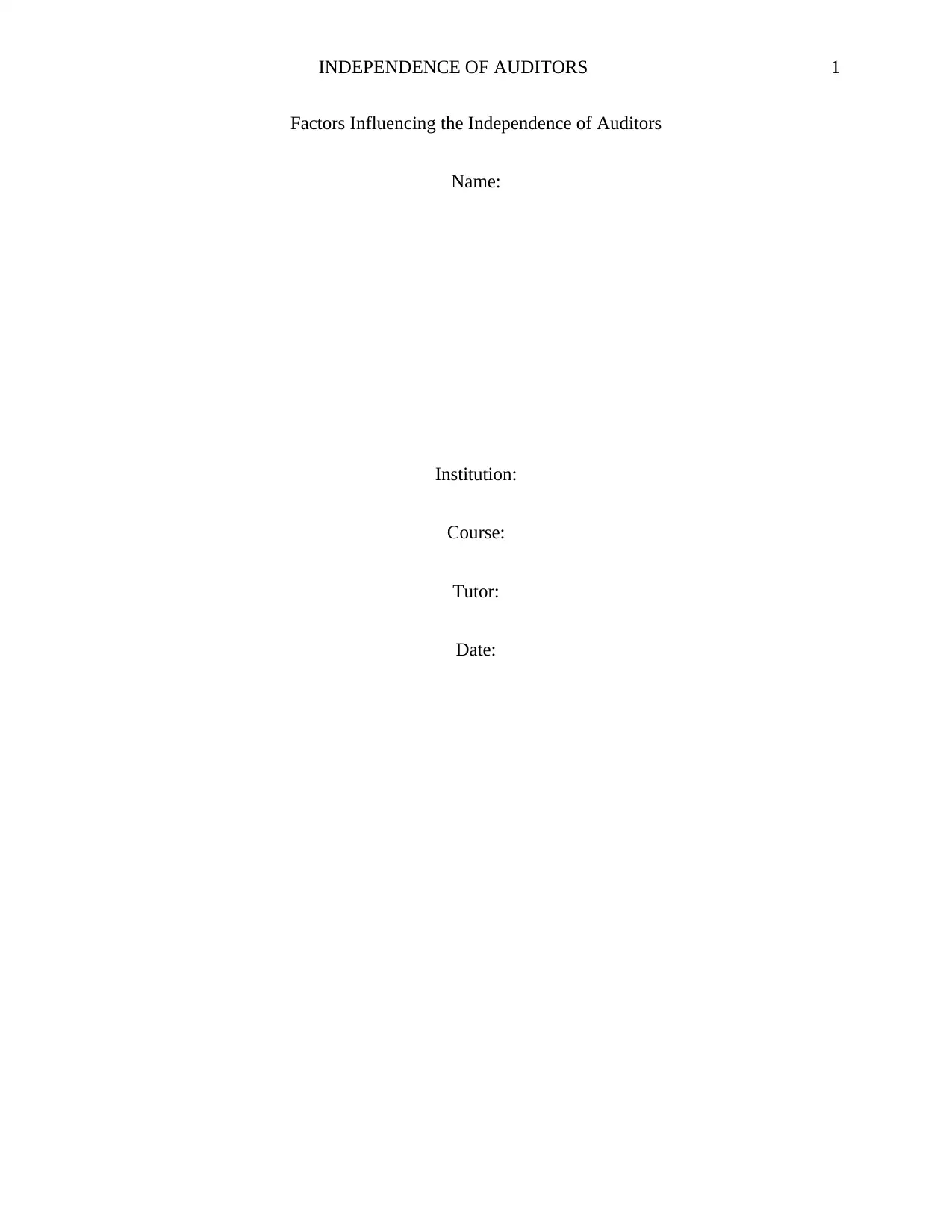
INDEPENDENCE OF AUDITORS 1
Factors Influencing the Independence of Auditors
Name:
Institution:
Course:
Tutor:
Date:
Factors Influencing the Independence of Auditors
Name:
Institution:
Course:
Tutor:
Date:
Paraphrase This Document
Need a fresh take? Get an instant paraphrase of this document with our AI Paraphraser
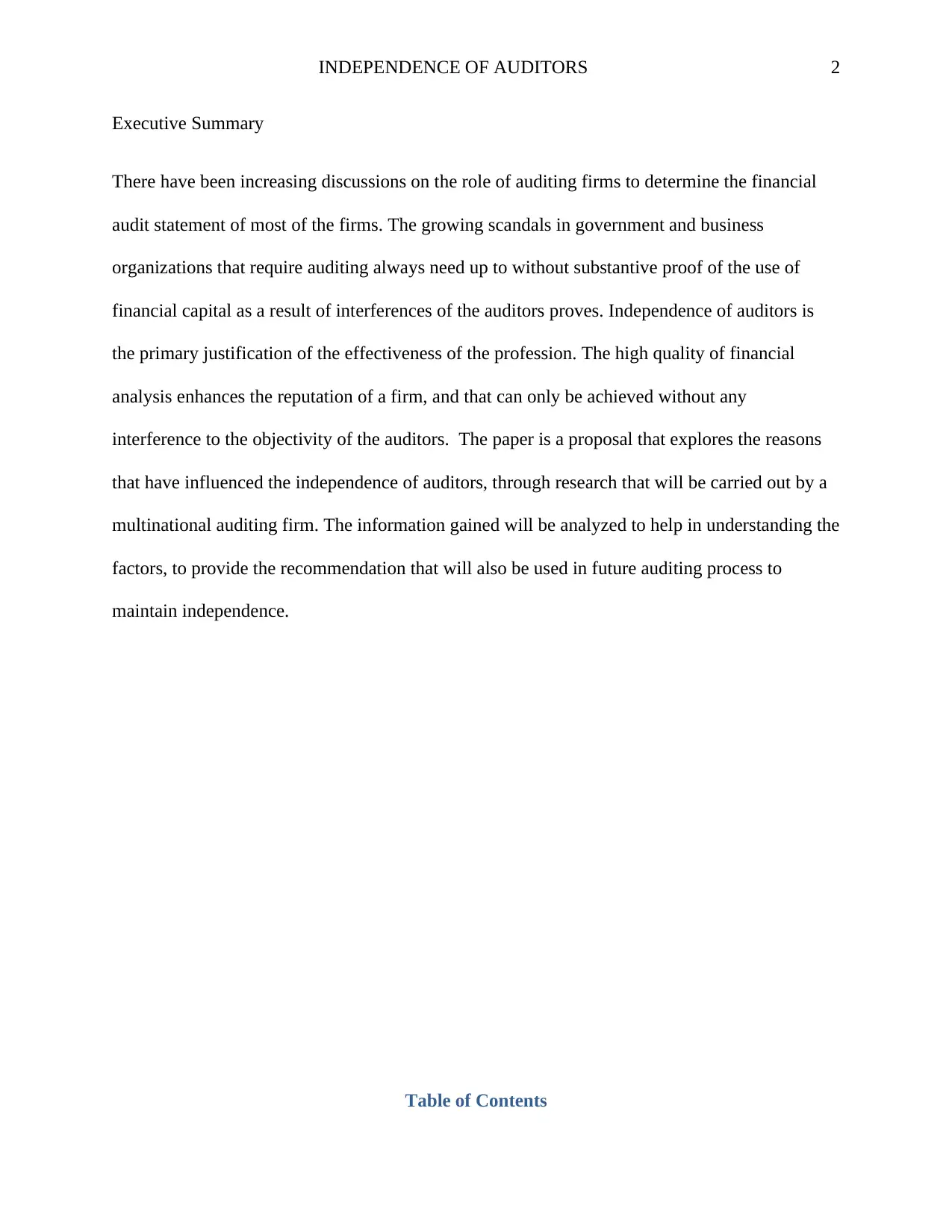
INDEPENDENCE OF AUDITORS 2
Executive Summary
There have been increasing discussions on the role of auditing firms to determine the financial
audit statement of most of the firms. The growing scandals in government and business
organizations that require auditing always need up to without substantive proof of the use of
financial capital as a result of interferences of the auditors proves. Independence of auditors is
the primary justification of the effectiveness of the profession. The high quality of financial
analysis enhances the reputation of a firm, and that can only be achieved without any
interference to the objectivity of the auditors. The paper is a proposal that explores the reasons
that have influenced the independence of auditors, through research that will be carried out by a
multinational auditing firm. The information gained will be analyzed to help in understanding the
factors, to provide the recommendation that will also be used in future auditing process to
maintain independence.
Table of Contents
Executive Summary
There have been increasing discussions on the role of auditing firms to determine the financial
audit statement of most of the firms. The growing scandals in government and business
organizations that require auditing always need up to without substantive proof of the use of
financial capital as a result of interferences of the auditors proves. Independence of auditors is
the primary justification of the effectiveness of the profession. The high quality of financial
analysis enhances the reputation of a firm, and that can only be achieved without any
interference to the objectivity of the auditors. The paper is a proposal that explores the reasons
that have influenced the independence of auditors, through research that will be carried out by a
multinational auditing firm. The information gained will be analyzed to help in understanding the
factors, to provide the recommendation that will also be used in future auditing process to
maintain independence.
Table of Contents
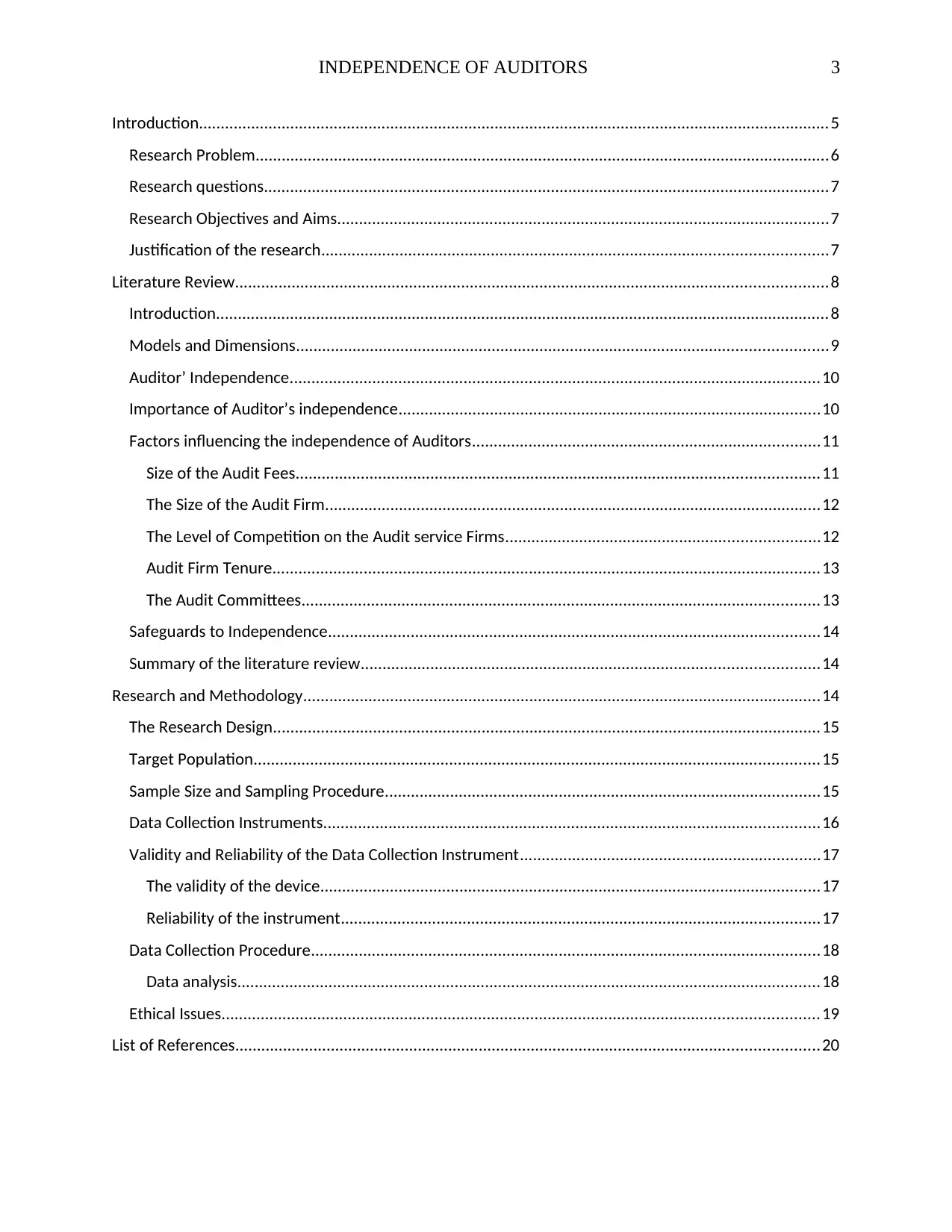
INDEPENDENCE OF AUDITORS 3
Introduction.................................................................................................................................................5
Research Problem....................................................................................................................................6
Research questions..................................................................................................................................7
Research Objectives and Aims.................................................................................................................7
Justification of the research....................................................................................................................7
Literature Review........................................................................................................................................8
Introduction.............................................................................................................................................8
Models and Dimensions..........................................................................................................................9
Auditor’ Independence..........................................................................................................................10
Importance of Auditor’s independence.................................................................................................10
Factors influencing the independence of Auditors................................................................................11
Size of the Audit Fees........................................................................................................................11
The Size of the Audit Firm..................................................................................................................12
The Level of Competition on the Audit service Firms........................................................................12
Audit Firm Tenure..............................................................................................................................13
The Audit Committees.......................................................................................................................13
Safeguards to Independence.................................................................................................................14
Summary of the literature review.........................................................................................................14
Research and Methodology.......................................................................................................................14
The Research Design..............................................................................................................................15
Target Population..................................................................................................................................15
Sample Size and Sampling Procedure....................................................................................................15
Data Collection Instruments..................................................................................................................16
Validity and Reliability of the Data Collection Instrument.....................................................................17
The validity of the device...................................................................................................................17
Reliability of the instrument..............................................................................................................17
Data Collection Procedure.....................................................................................................................18
Data analysis......................................................................................................................................18
Ethical Issues.........................................................................................................................................19
List of References......................................................................................................................................20
Introduction.................................................................................................................................................5
Research Problem....................................................................................................................................6
Research questions..................................................................................................................................7
Research Objectives and Aims.................................................................................................................7
Justification of the research....................................................................................................................7
Literature Review........................................................................................................................................8
Introduction.............................................................................................................................................8
Models and Dimensions..........................................................................................................................9
Auditor’ Independence..........................................................................................................................10
Importance of Auditor’s independence.................................................................................................10
Factors influencing the independence of Auditors................................................................................11
Size of the Audit Fees........................................................................................................................11
The Size of the Audit Firm..................................................................................................................12
The Level of Competition on the Audit service Firms........................................................................12
Audit Firm Tenure..............................................................................................................................13
The Audit Committees.......................................................................................................................13
Safeguards to Independence.................................................................................................................14
Summary of the literature review.........................................................................................................14
Research and Methodology.......................................................................................................................14
The Research Design..............................................................................................................................15
Target Population..................................................................................................................................15
Sample Size and Sampling Procedure....................................................................................................15
Data Collection Instruments..................................................................................................................16
Validity and Reliability of the Data Collection Instrument.....................................................................17
The validity of the device...................................................................................................................17
Reliability of the instrument..............................................................................................................17
Data Collection Procedure.....................................................................................................................18
Data analysis......................................................................................................................................18
Ethical Issues.........................................................................................................................................19
List of References......................................................................................................................................20
⊘ This is a preview!⊘
Do you want full access?
Subscribe today to unlock all pages.

Trusted by 1+ million students worldwide
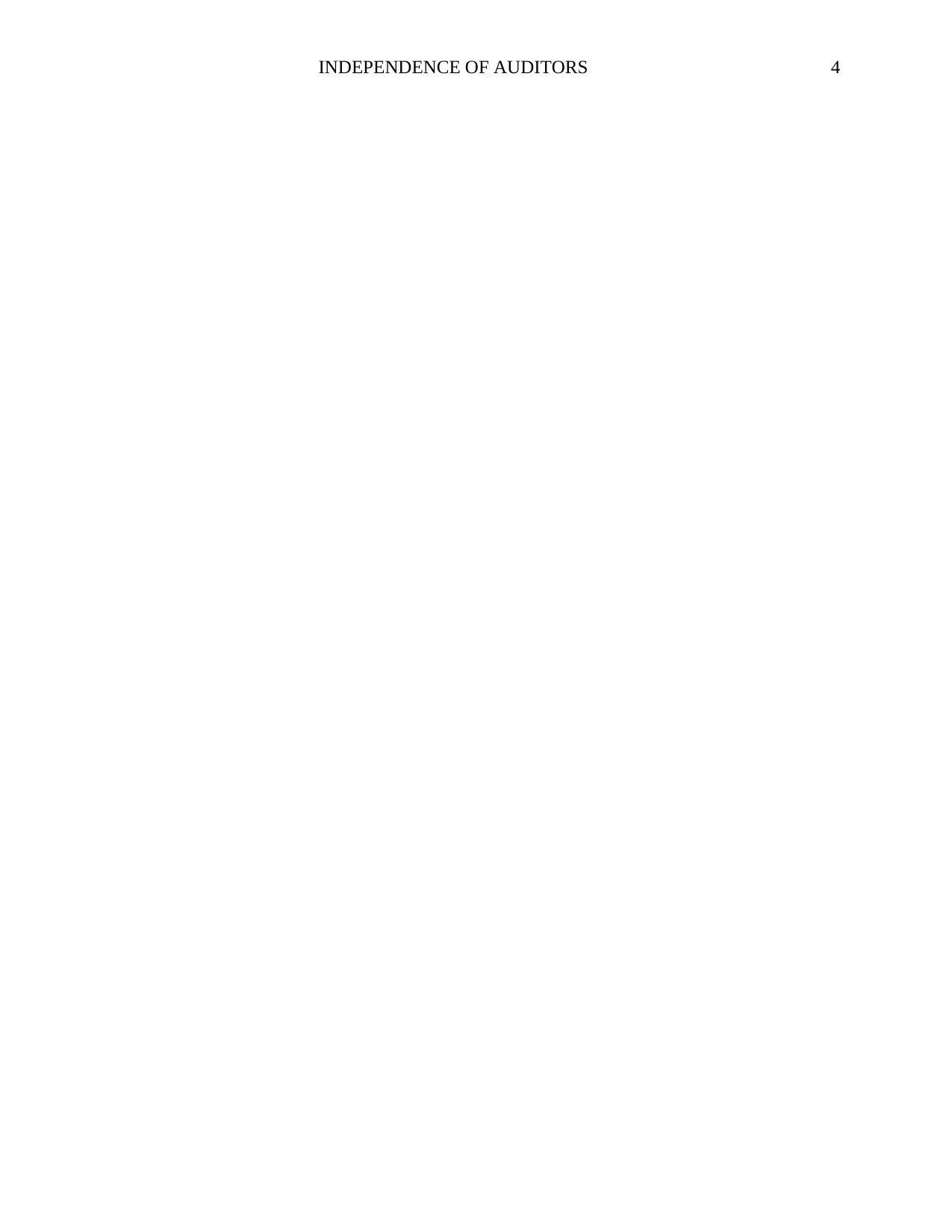
INDEPENDENCE OF AUDITORS 4
Paraphrase This Document
Need a fresh take? Get an instant paraphrase of this document with our AI Paraphraser
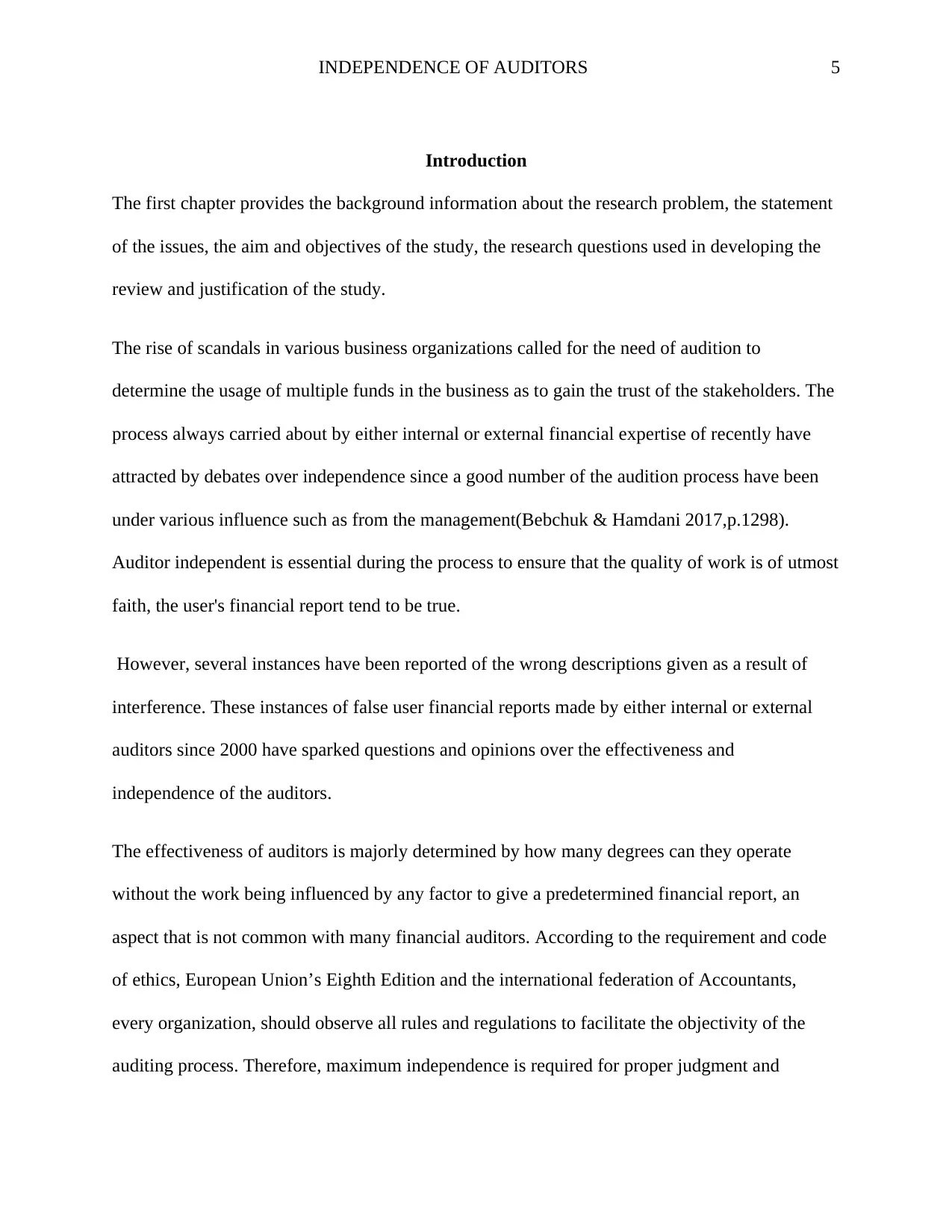
INDEPENDENCE OF AUDITORS 5
Introduction
The first chapter provides the background information about the research problem, the statement
of the issues, the aim and objectives of the study, the research questions used in developing the
review and justification of the study.
The rise of scandals in various business organizations called for the need of audition to
determine the usage of multiple funds in the business as to gain the trust of the stakeholders. The
process always carried about by either internal or external financial expertise of recently have
attracted by debates over independence since a good number of the audition process have been
under various influence such as from the management(Bebchuk & Hamdani 2017,p.1298).
Auditor independent is essential during the process to ensure that the quality of work is of utmost
faith, the user's financial report tend to be true.
However, several instances have been reported of the wrong descriptions given as a result of
interference. These instances of false user financial reports made by either internal or external
auditors since 2000 have sparked questions and opinions over the effectiveness and
independence of the auditors.
The effectiveness of auditors is majorly determined by how many degrees can they operate
without the work being influenced by any factor to give a predetermined financial report, an
aspect that is not common with many financial auditors. According to the requirement and code
of ethics, European Union’s Eighth Edition and the international federation of Accountants,
every organization, should observe all rules and regulations to facilitate the objectivity of the
auditing process. Therefore, maximum independence is required for proper judgment and
Introduction
The first chapter provides the background information about the research problem, the statement
of the issues, the aim and objectives of the study, the research questions used in developing the
review and justification of the study.
The rise of scandals in various business organizations called for the need of audition to
determine the usage of multiple funds in the business as to gain the trust of the stakeholders. The
process always carried about by either internal or external financial expertise of recently have
attracted by debates over independence since a good number of the audition process have been
under various influence such as from the management(Bebchuk & Hamdani 2017,p.1298).
Auditor independent is essential during the process to ensure that the quality of work is of utmost
faith, the user's financial report tend to be true.
However, several instances have been reported of the wrong descriptions given as a result of
interference. These instances of false user financial reports made by either internal or external
auditors since 2000 have sparked questions and opinions over the effectiveness and
independence of the auditors.
The effectiveness of auditors is majorly determined by how many degrees can they operate
without the work being influenced by any factor to give a predetermined financial report, an
aspect that is not common with many financial auditors. According to the requirement and code
of ethics, European Union’s Eighth Edition and the international federation of Accountants,
every organization, should observe all rules and regulations to facilitate the objectivity of the
auditing process. Therefore, maximum independence is required for proper judgment and
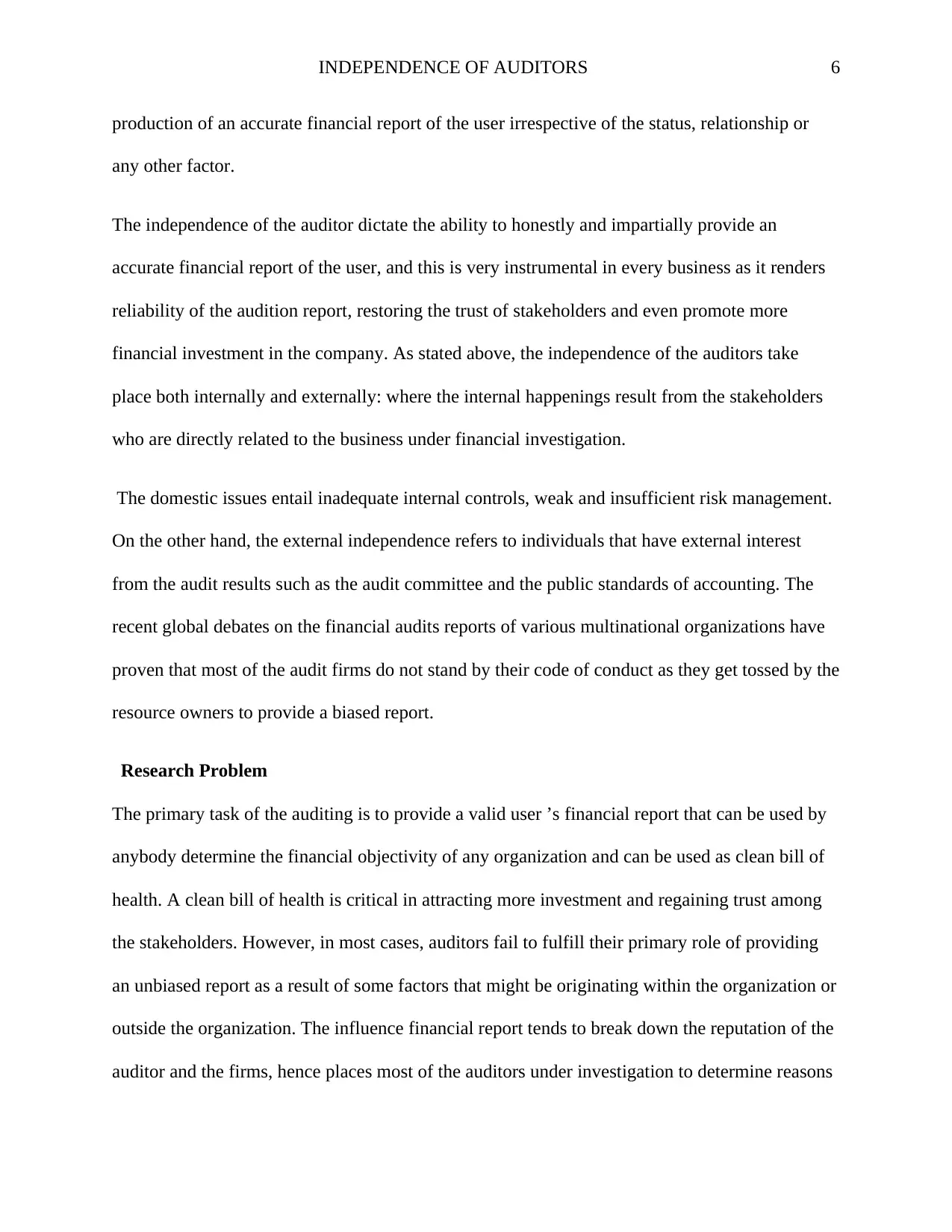
INDEPENDENCE OF AUDITORS 6
production of an accurate financial report of the user irrespective of the status, relationship or
any other factor.
The independence of the auditor dictate the ability to honestly and impartially provide an
accurate financial report of the user, and this is very instrumental in every business as it renders
reliability of the audition report, restoring the trust of stakeholders and even promote more
financial investment in the company. As stated above, the independence of the auditors take
place both internally and externally: where the internal happenings result from the stakeholders
who are directly related to the business under financial investigation.
The domestic issues entail inadequate internal controls, weak and insufficient risk management.
On the other hand, the external independence refers to individuals that have external interest
from the audit results such as the audit committee and the public standards of accounting. The
recent global debates on the financial audits reports of various multinational organizations have
proven that most of the audit firms do not stand by their code of conduct as they get tossed by the
resource owners to provide a biased report.
Research Problem
The primary task of the auditing is to provide a valid user ’s financial report that can be used by
anybody determine the financial objectivity of any organization and can be used as clean bill of
health. A clean bill of health is critical in attracting more investment and regaining trust among
the stakeholders. However, in most cases, auditors fail to fulfill their primary role of providing
an unbiased report as a result of some factors that might be originating within the organization or
outside the organization. The influence financial report tends to break down the reputation of the
auditor and the firms, hence places most of the auditors under investigation to determine reasons
production of an accurate financial report of the user irrespective of the status, relationship or
any other factor.
The independence of the auditor dictate the ability to honestly and impartially provide an
accurate financial report of the user, and this is very instrumental in every business as it renders
reliability of the audition report, restoring the trust of stakeholders and even promote more
financial investment in the company. As stated above, the independence of the auditors take
place both internally and externally: where the internal happenings result from the stakeholders
who are directly related to the business under financial investigation.
The domestic issues entail inadequate internal controls, weak and insufficient risk management.
On the other hand, the external independence refers to individuals that have external interest
from the audit results such as the audit committee and the public standards of accounting. The
recent global debates on the financial audits reports of various multinational organizations have
proven that most of the audit firms do not stand by their code of conduct as they get tossed by the
resource owners to provide a biased report.
Research Problem
The primary task of the auditing is to provide a valid user ’s financial report that can be used by
anybody determine the financial objectivity of any organization and can be used as clean bill of
health. A clean bill of health is critical in attracting more investment and regaining trust among
the stakeholders. However, in most cases, auditors fail to fulfill their primary role of providing
an unbiased report as a result of some factors that might be originating within the organization or
outside the organization. The influence financial report tends to break down the reputation of the
auditor and the firms, hence places most of the auditors under investigation to determine reasons
⊘ This is a preview!⊘
Do you want full access?
Subscribe today to unlock all pages.

Trusted by 1+ million students worldwide
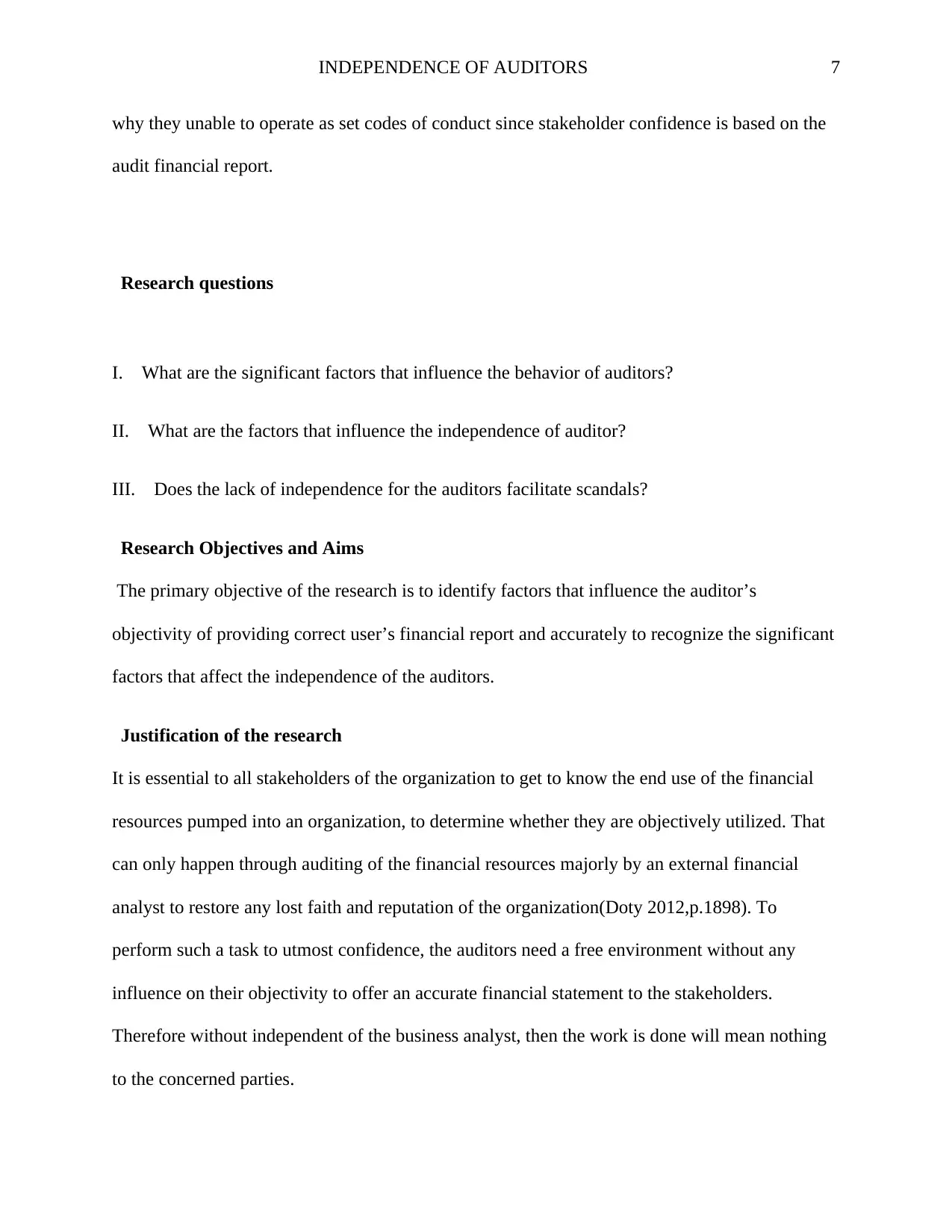
INDEPENDENCE OF AUDITORS 7
why they unable to operate as set codes of conduct since stakeholder confidence is based on the
audit financial report.
Research questions
I. What are the significant factors that influence the behavior of auditors?
II. What are the factors that influence the independence of auditor?
III. Does the lack of independence for the auditors facilitate scandals?
Research Objectives and Aims
The primary objective of the research is to identify factors that influence the auditor’s
objectivity of providing correct user’s financial report and accurately to recognize the significant
factors that affect the independence of the auditors.
Justification of the research
It is essential to all stakeholders of the organization to get to know the end use of the financial
resources pumped into an organization, to determine whether they are objectively utilized. That
can only happen through auditing of the financial resources majorly by an external financial
analyst to restore any lost faith and reputation of the organization(Doty 2012,p.1898). To
perform such a task to utmost confidence, the auditors need a free environment without any
influence on their objectivity to offer an accurate financial statement to the stakeholders.
Therefore without independent of the business analyst, then the work is done will mean nothing
to the concerned parties.
why they unable to operate as set codes of conduct since stakeholder confidence is based on the
audit financial report.
Research questions
I. What are the significant factors that influence the behavior of auditors?
II. What are the factors that influence the independence of auditor?
III. Does the lack of independence for the auditors facilitate scandals?
Research Objectives and Aims
The primary objective of the research is to identify factors that influence the auditor’s
objectivity of providing correct user’s financial report and accurately to recognize the significant
factors that affect the independence of the auditors.
Justification of the research
It is essential to all stakeholders of the organization to get to know the end use of the financial
resources pumped into an organization, to determine whether they are objectively utilized. That
can only happen through auditing of the financial resources majorly by an external financial
analyst to restore any lost faith and reputation of the organization(Doty 2012,p.1898). To
perform such a task to utmost confidence, the auditors need a free environment without any
influence on their objectivity to offer an accurate financial statement to the stakeholders.
Therefore without independent of the business analyst, then the work is done will mean nothing
to the concerned parties.
Paraphrase This Document
Need a fresh take? Get an instant paraphrase of this document with our AI Paraphraser
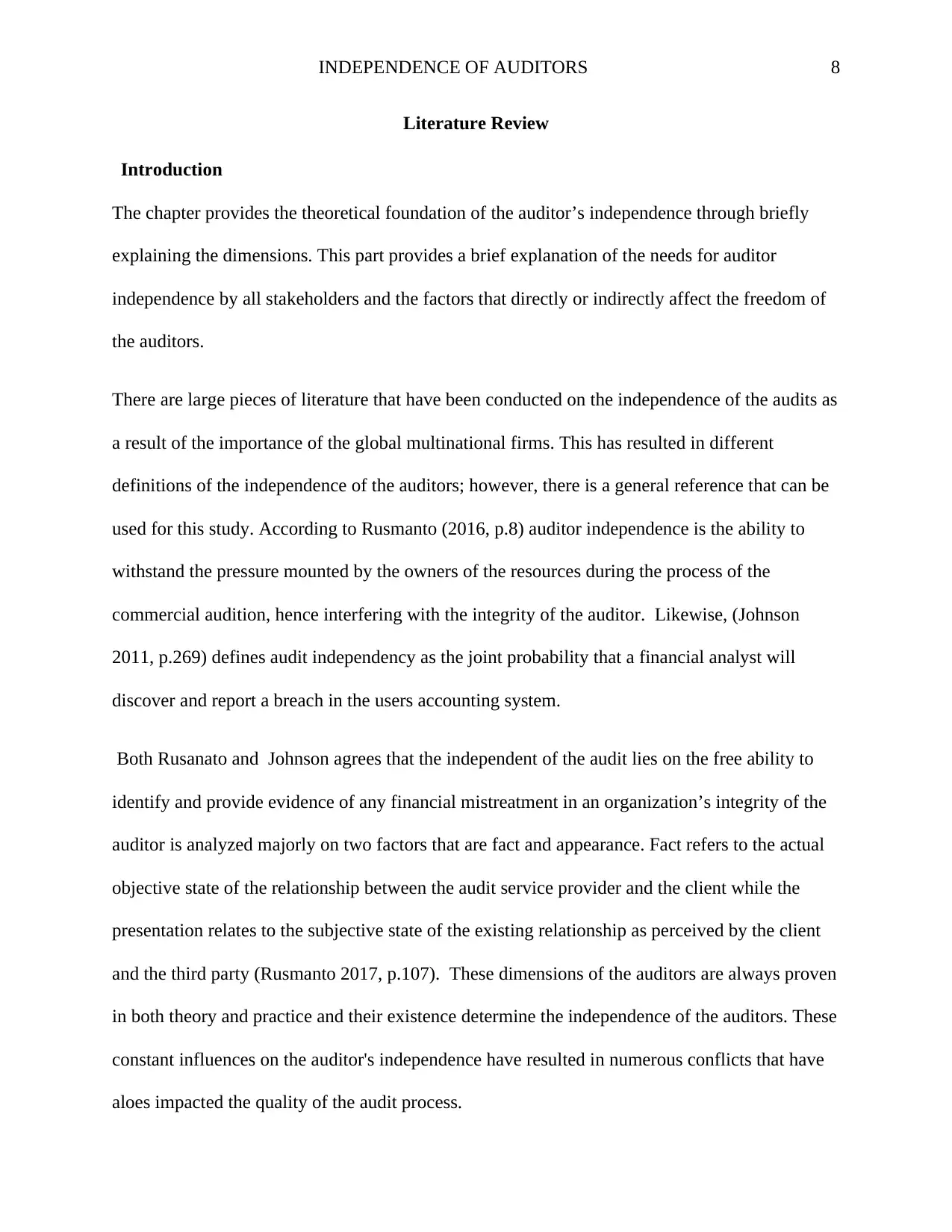
INDEPENDENCE OF AUDITORS 8
Literature Review
Introduction
The chapter provides the theoretical foundation of the auditor’s independence through briefly
explaining the dimensions. This part provides a brief explanation of the needs for auditor
independence by all stakeholders and the factors that directly or indirectly affect the freedom of
the auditors.
There are large pieces of literature that have been conducted on the independence of the audits as
a result of the importance of the global multinational firms. This has resulted in different
definitions of the independence of the auditors; however, there is a general reference that can be
used for this study. According to Rusmanto (2016, p.8) auditor independence is the ability to
withstand the pressure mounted by the owners of the resources during the process of the
commercial audition, hence interfering with the integrity of the auditor. Likewise, (Johnson
2011, p.269) defines audit independency as the joint probability that a financial analyst will
discover and report a breach in the users accounting system.
Both Rusanato and Johnson agrees that the independent of the audit lies on the free ability to
identify and provide evidence of any financial mistreatment in an organization’s integrity of the
auditor is analyzed majorly on two factors that are fact and appearance. Fact refers to the actual
objective state of the relationship between the audit service provider and the client while the
presentation relates to the subjective state of the existing relationship as perceived by the client
and the third party (Rusmanto 2017, p.107). These dimensions of the auditors are always proven
in both theory and practice and their existence determine the independence of the auditors. These
constant influences on the auditor's independence have resulted in numerous conflicts that have
aloes impacted the quality of the audit process.
Literature Review
Introduction
The chapter provides the theoretical foundation of the auditor’s independence through briefly
explaining the dimensions. This part provides a brief explanation of the needs for auditor
independence by all stakeholders and the factors that directly or indirectly affect the freedom of
the auditors.
There are large pieces of literature that have been conducted on the independence of the audits as
a result of the importance of the global multinational firms. This has resulted in different
definitions of the independence of the auditors; however, there is a general reference that can be
used for this study. According to Rusmanto (2016, p.8) auditor independence is the ability to
withstand the pressure mounted by the owners of the resources during the process of the
commercial audition, hence interfering with the integrity of the auditor. Likewise, (Johnson
2011, p.269) defines audit independency as the joint probability that a financial analyst will
discover and report a breach in the users accounting system.
Both Rusanato and Johnson agrees that the independent of the audit lies on the free ability to
identify and provide evidence of any financial mistreatment in an organization’s integrity of the
auditor is analyzed majorly on two factors that are fact and appearance. Fact refers to the actual
objective state of the relationship between the audit service provider and the client while the
presentation relates to the subjective state of the existing relationship as perceived by the client
and the third party (Rusmanto 2017, p.107). These dimensions of the auditors are always proven
in both theory and practice and their existence determine the independence of the auditors. These
constant influences on the auditor's independence have resulted in numerous conflicts that have
aloes impacted the quality of the audit process.
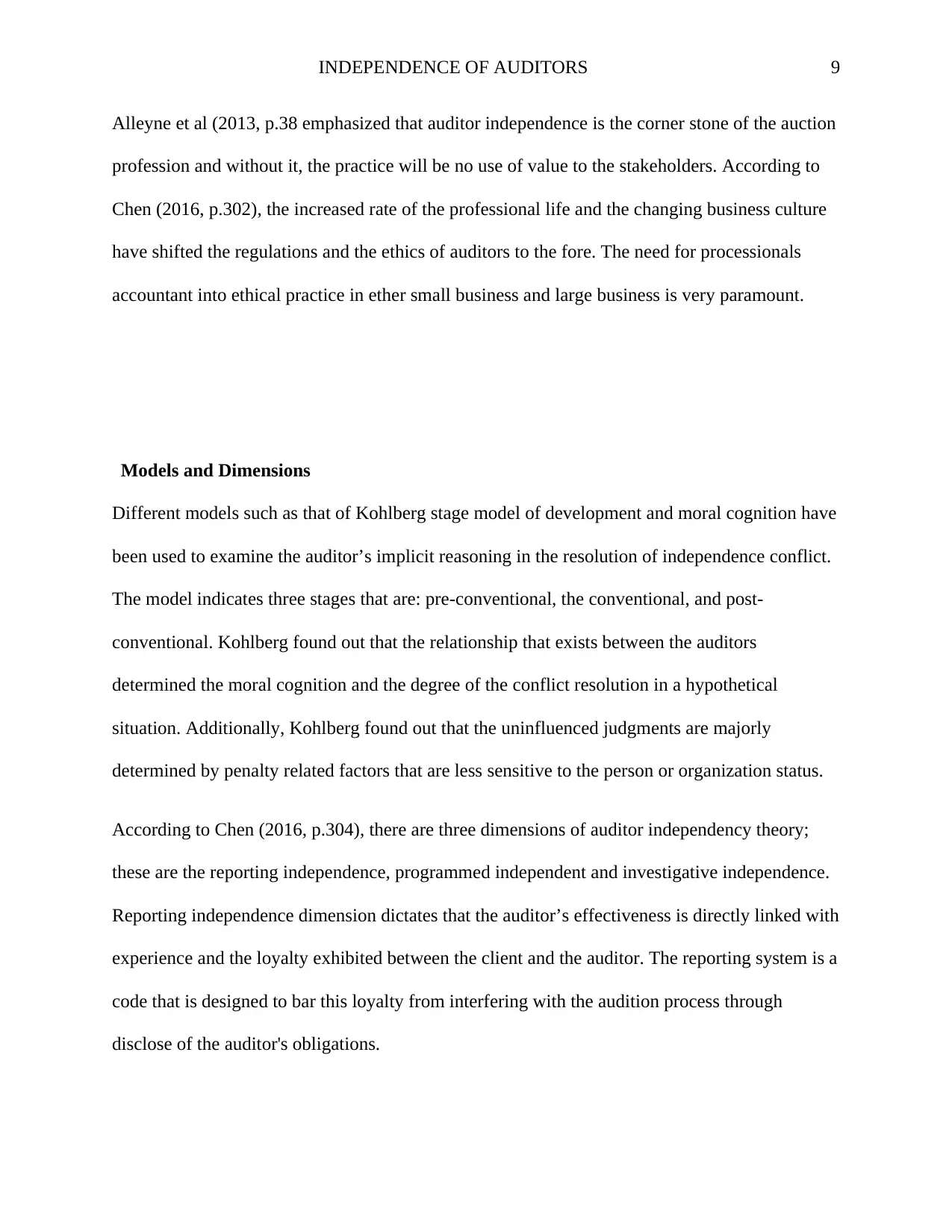
INDEPENDENCE OF AUDITORS 9
Alleyne et al (2013, p.38 emphasized that auditor independence is the corner stone of the auction
profession and without it, the practice will be no use of value to the stakeholders. According to
Chen (2016, p.302), the increased rate of the professional life and the changing business culture
have shifted the regulations and the ethics of auditors to the fore. The need for processionals
accountant into ethical practice in ether small business and large business is very paramount.
Models and Dimensions
Different models such as that of Kohlberg stage model of development and moral cognition have
been used to examine the auditor’s implicit reasoning in the resolution of independence conflict.
The model indicates three stages that are: pre-conventional, the conventional, and post-
conventional. Kohlberg found out that the relationship that exists between the auditors
determined the moral cognition and the degree of the conflict resolution in a hypothetical
situation. Additionally, Kohlberg found out that the uninfluenced judgments are majorly
determined by penalty related factors that are less sensitive to the person or organization status.
According to Chen (2016, p.304), there are three dimensions of auditor independency theory;
these are the reporting independence, programmed independent and investigative independence.
Reporting independence dimension dictates that the auditor’s effectiveness is directly linked with
experience and the loyalty exhibited between the client and the auditor. The reporting system is a
code that is designed to bar this loyalty from interfering with the audition process through
disclose of the auditor's obligations.
Alleyne et al (2013, p.38 emphasized that auditor independence is the corner stone of the auction
profession and without it, the practice will be no use of value to the stakeholders. According to
Chen (2016, p.302), the increased rate of the professional life and the changing business culture
have shifted the regulations and the ethics of auditors to the fore. The need for processionals
accountant into ethical practice in ether small business and large business is very paramount.
Models and Dimensions
Different models such as that of Kohlberg stage model of development and moral cognition have
been used to examine the auditor’s implicit reasoning in the resolution of independence conflict.
The model indicates three stages that are: pre-conventional, the conventional, and post-
conventional. Kohlberg found out that the relationship that exists between the auditors
determined the moral cognition and the degree of the conflict resolution in a hypothetical
situation. Additionally, Kohlberg found out that the uninfluenced judgments are majorly
determined by penalty related factors that are less sensitive to the person or organization status.
According to Chen (2016, p.304), there are three dimensions of auditor independency theory;
these are the reporting independence, programmed independent and investigative independence.
Reporting independence dimension dictates that the auditor’s effectiveness is directly linked with
experience and the loyalty exhibited between the client and the auditor. The reporting system is a
code that is designed to bar this loyalty from interfering with the audition process through
disclose of the auditor's obligations.
⊘ This is a preview!⊘
Do you want full access?
Subscribe today to unlock all pages.

Trusted by 1+ million students worldwide
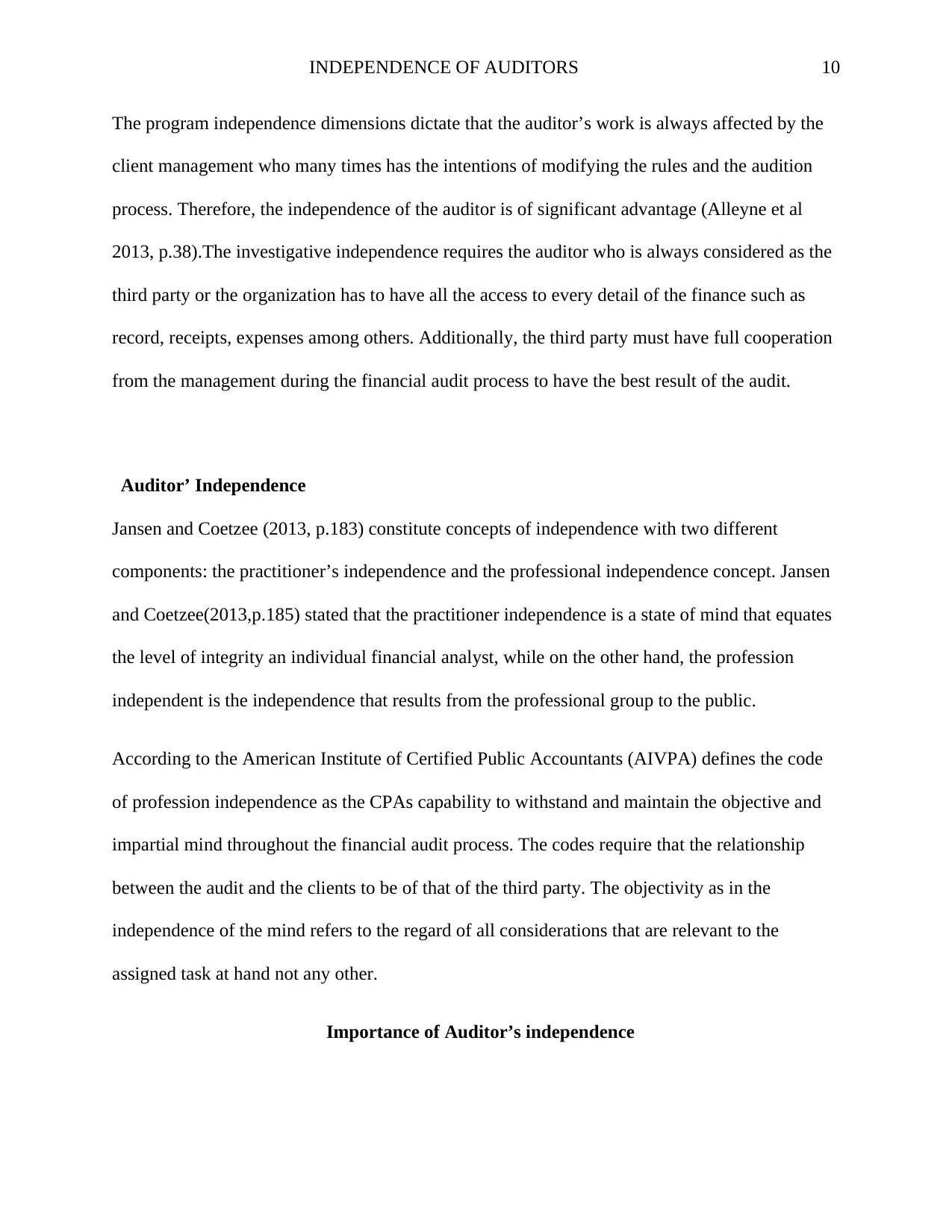
INDEPENDENCE OF AUDITORS 10
The program independence dimensions dictate that the auditor’s work is always affected by the
client management who many times has the intentions of modifying the rules and the audition
process. Therefore, the independence of the auditor is of significant advantage (Alleyne et al
2013, p.38).The investigative independence requires the auditor who is always considered as the
third party or the organization has to have all the access to every detail of the finance such as
record, receipts, expenses among others. Additionally, the third party must have full cooperation
from the management during the financial audit process to have the best result of the audit.
Auditor’ Independence
Jansen and Coetzee (2013, p.183) constitute concepts of independence with two different
components: the practitioner’s independence and the professional independence concept. Jansen
and Coetzee(2013,p.185) stated that the practitioner independence is a state of mind that equates
the level of integrity an individual financial analyst, while on the other hand, the profession
independent is the independence that results from the professional group to the public.
According to the American Institute of Certified Public Accountants (AIVPA) defines the code
of profession independence as the CPAs capability to withstand and maintain the objective and
impartial mind throughout the financial audit process. The codes require that the relationship
between the audit and the clients to be of that of the third party. The objectivity as in the
independence of the mind refers to the regard of all considerations that are relevant to the
assigned task at hand not any other.
Importance of Auditor’s independence
The program independence dimensions dictate that the auditor’s work is always affected by the
client management who many times has the intentions of modifying the rules and the audition
process. Therefore, the independence of the auditor is of significant advantage (Alleyne et al
2013, p.38).The investigative independence requires the auditor who is always considered as the
third party or the organization has to have all the access to every detail of the finance such as
record, receipts, expenses among others. Additionally, the third party must have full cooperation
from the management during the financial audit process to have the best result of the audit.
Auditor’ Independence
Jansen and Coetzee (2013, p.183) constitute concepts of independence with two different
components: the practitioner’s independence and the professional independence concept. Jansen
and Coetzee(2013,p.185) stated that the practitioner independence is a state of mind that equates
the level of integrity an individual financial analyst, while on the other hand, the profession
independent is the independence that results from the professional group to the public.
According to the American Institute of Certified Public Accountants (AIVPA) defines the code
of profession independence as the CPAs capability to withstand and maintain the objective and
impartial mind throughout the financial audit process. The codes require that the relationship
between the audit and the clients to be of that of the third party. The objectivity as in the
independence of the mind refers to the regard of all considerations that are relevant to the
assigned task at hand not any other.
Importance of Auditor’s independence
Paraphrase This Document
Need a fresh take? Get an instant paraphrase of this document with our AI Paraphraser
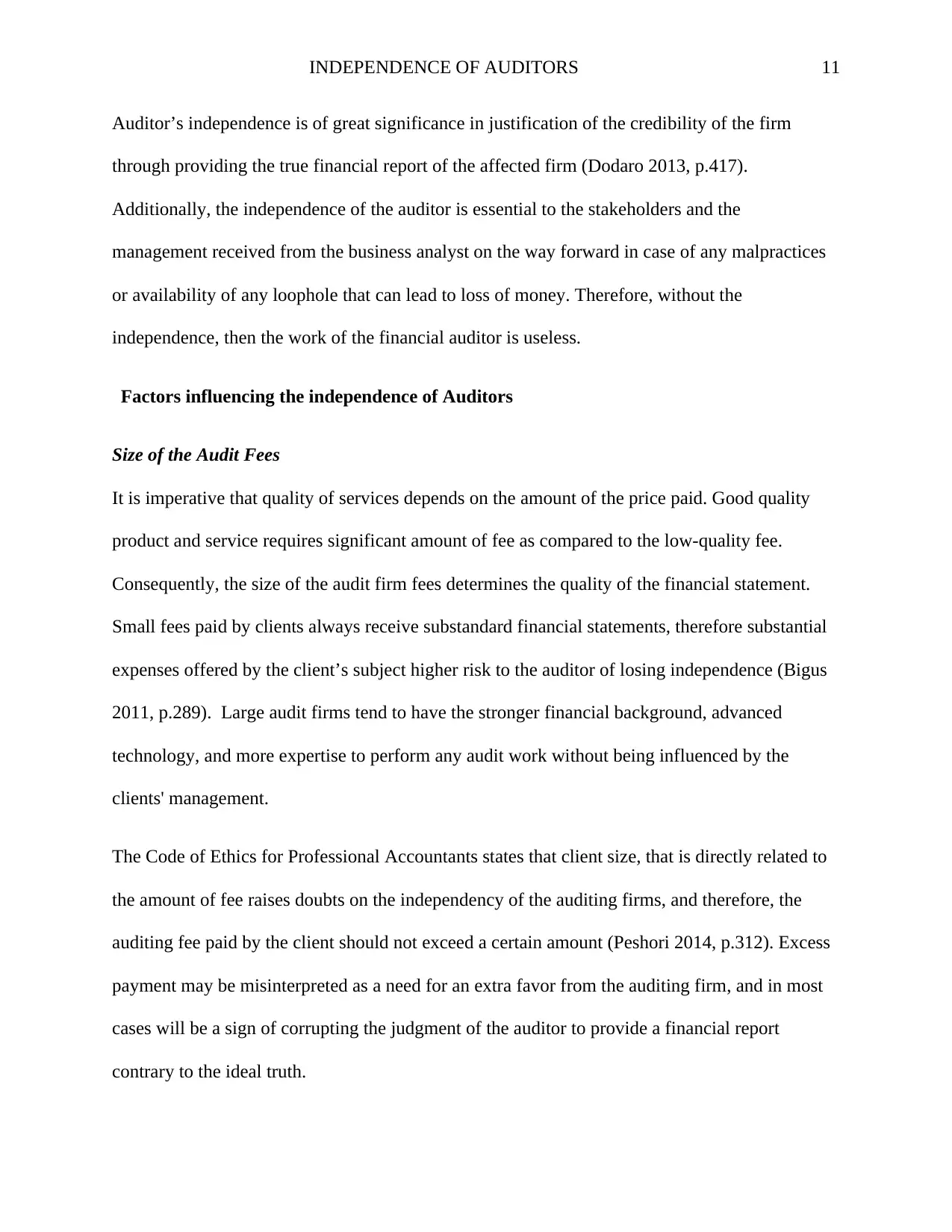
INDEPENDENCE OF AUDITORS 11
Auditor’s independence is of great significance in justification of the credibility of the firm
through providing the true financial report of the affected firm (Dodaro 2013, p.417).
Additionally, the independence of the auditor is essential to the stakeholders and the
management received from the business analyst on the way forward in case of any malpractices
or availability of any loophole that can lead to loss of money. Therefore, without the
independence, then the work of the financial auditor is useless.
Factors influencing the independence of Auditors
Size of the Audit Fees
It is imperative that quality of services depends on the amount of the price paid. Good quality
product and service requires significant amount of fee as compared to the low-quality fee.
Consequently, the size of the audit firm fees determines the quality of the financial statement.
Small fees paid by clients always receive substandard financial statements, therefore substantial
expenses offered by the client’s subject higher risk to the auditor of losing independence (Bigus
2011, p.289). Large audit firms tend to have the stronger financial background, advanced
technology, and more expertise to perform any audit work without being influenced by the
clients' management.
The Code of Ethics for Professional Accountants states that client size, that is directly related to
the amount of fee raises doubts on the independency of the auditing firms, and therefore, the
auditing fee paid by the client should not exceed a certain amount (Peshori 2014, p.312). Excess
payment may be misinterpreted as a need for an extra favor from the auditing firm, and in most
cases will be a sign of corrupting the judgment of the auditor to provide a financial report
contrary to the ideal truth.
Auditor’s independence is of great significance in justification of the credibility of the firm
through providing the true financial report of the affected firm (Dodaro 2013, p.417).
Additionally, the independence of the auditor is essential to the stakeholders and the
management received from the business analyst on the way forward in case of any malpractices
or availability of any loophole that can lead to loss of money. Therefore, without the
independence, then the work of the financial auditor is useless.
Factors influencing the independence of Auditors
Size of the Audit Fees
It is imperative that quality of services depends on the amount of the price paid. Good quality
product and service requires significant amount of fee as compared to the low-quality fee.
Consequently, the size of the audit firm fees determines the quality of the financial statement.
Small fees paid by clients always receive substandard financial statements, therefore substantial
expenses offered by the client’s subject higher risk to the auditor of losing independence (Bigus
2011, p.289). Large audit firms tend to have the stronger financial background, advanced
technology, and more expertise to perform any audit work without being influenced by the
clients' management.
The Code of Ethics for Professional Accountants states that client size, that is directly related to
the amount of fee raises doubts on the independency of the auditing firms, and therefore, the
auditing fee paid by the client should not exceed a certain amount (Peshori 2014, p.312). Excess
payment may be misinterpreted as a need for an extra favor from the auditing firm, and in most
cases will be a sign of corrupting the judgment of the auditor to provide a financial report
contrary to the ideal truth.
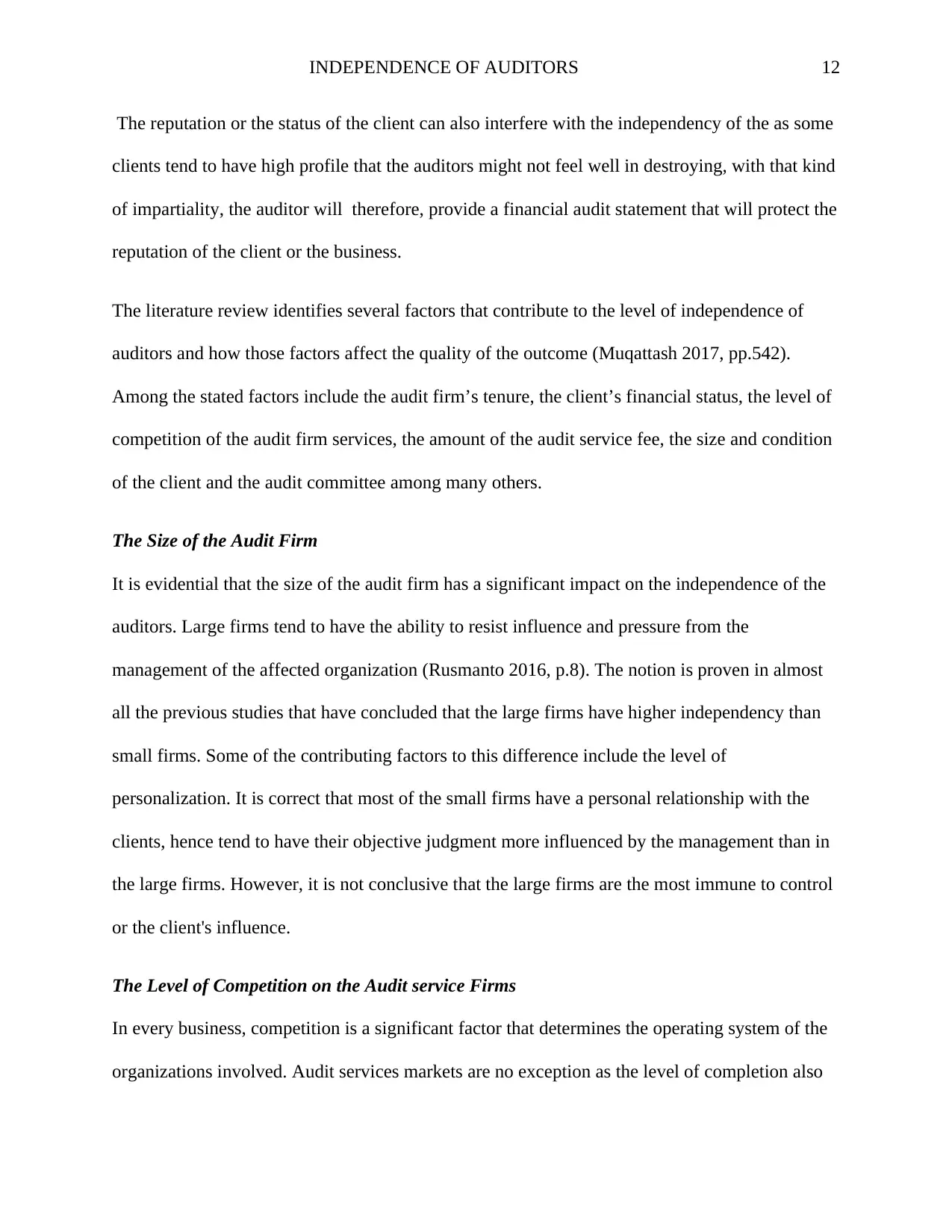
INDEPENDENCE OF AUDITORS 12
The reputation or the status of the client can also interfere with the independency of the as some
clients tend to have high profile that the auditors might not feel well in destroying, with that kind
of impartiality, the auditor will therefore, provide a financial audit statement that will protect the
reputation of the client or the business.
The literature review identifies several factors that contribute to the level of independence of
auditors and how those factors affect the quality of the outcome (Muqattash 2017, pp.542).
Among the stated factors include the audit firm’s tenure, the client’s financial status, the level of
competition of the audit firm services, the amount of the audit service fee, the size and condition
of the client and the audit committee among many others.
The Size of the Audit Firm
It is evidential that the size of the audit firm has a significant impact on the independence of the
auditors. Large firms tend to have the ability to resist influence and pressure from the
management of the affected organization (Rusmanto 2016, p.8). The notion is proven in almost
all the previous studies that have concluded that the large firms have higher independency than
small firms. Some of the contributing factors to this difference include the level of
personalization. It is correct that most of the small firms have a personal relationship with the
clients, hence tend to have their objective judgment more influenced by the management than in
the large firms. However, it is not conclusive that the large firms are the most immune to control
or the client's influence.
The Level of Competition on the Audit service Firms
In every business, competition is a significant factor that determines the operating system of the
organizations involved. Audit services markets are no exception as the level of completion also
The reputation or the status of the client can also interfere with the independency of the as some
clients tend to have high profile that the auditors might not feel well in destroying, with that kind
of impartiality, the auditor will therefore, provide a financial audit statement that will protect the
reputation of the client or the business.
The literature review identifies several factors that contribute to the level of independence of
auditors and how those factors affect the quality of the outcome (Muqattash 2017, pp.542).
Among the stated factors include the audit firm’s tenure, the client’s financial status, the level of
competition of the audit firm services, the amount of the audit service fee, the size and condition
of the client and the audit committee among many others.
The Size of the Audit Firm
It is evidential that the size of the audit firm has a significant impact on the independence of the
auditors. Large firms tend to have the ability to resist influence and pressure from the
management of the affected organization (Rusmanto 2016, p.8). The notion is proven in almost
all the previous studies that have concluded that the large firms have higher independency than
small firms. Some of the contributing factors to this difference include the level of
personalization. It is correct that most of the small firms have a personal relationship with the
clients, hence tend to have their objective judgment more influenced by the management than in
the large firms. However, it is not conclusive that the large firms are the most immune to control
or the client's influence.
The Level of Competition on the Audit service Firms
In every business, competition is a significant factor that determines the operating system of the
organizations involved. Audit services markets are no exception as the level of completion also
⊘ This is a preview!⊘
Do you want full access?
Subscribe today to unlock all pages.

Trusted by 1+ million students worldwide
1 out of 23
Related Documents
Your All-in-One AI-Powered Toolkit for Academic Success.
+13062052269
info@desklib.com
Available 24*7 on WhatsApp / Email
![[object Object]](/_next/static/media/star-bottom.7253800d.svg)
Unlock your academic potential
Copyright © 2020–2025 A2Z Services. All Rights Reserved. Developed and managed by ZUCOL.





